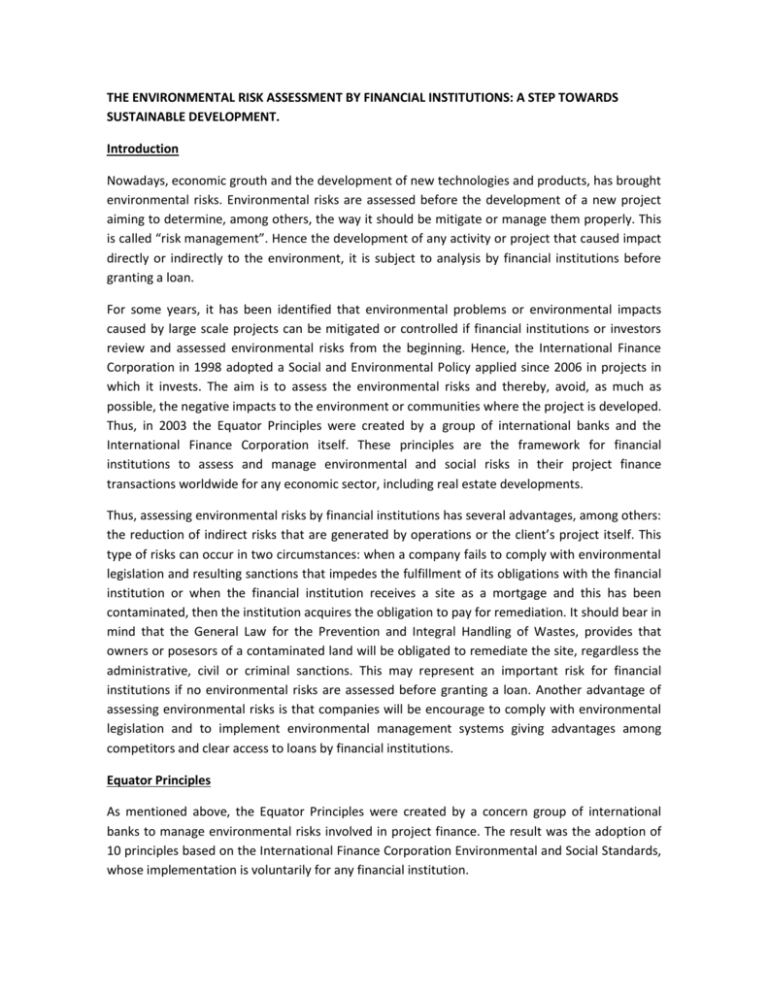THE ENVIRONMENTAL RISK ASSESSMENT BY FINANCIAL
advertisement

THE ENVIRONMENTAL RISK ASSESSMENT BY FINANCIAL INSTITUTIONS: A STEP TOWARDS SUSTAINABLE DEVELOPMENT. Introduction Nowadays, economic grouth and the development of new technologies and products, has brought environmental risks. Environmental risks are assessed before the development of a new project aiming to determine, among others, the way it should be mitigate or manage them properly. This is called “risk management”. Hence the development of any activity or project that caused impact directly or indirectly to the environment, it is subject to analysis by financial institutions before granting a loan. For some years, it has been identified that environmental problems or environmental impacts caused by large scale projects can be mitigated or controlled if financial institutions or investors review and assessed environmental risks from the beginning. Hence, the International Finance Corporation in 1998 adopted a Social and Environmental Policy applied since 2006 in projects in which it invests. The aim is to assess the environmental risks and thereby, avoid, as much as possible, the negative impacts to the environment or communities where the project is developed. Thus, in 2003 the Equator Principles were created by a group of international banks and the International Finance Corporation itself. These principles are the framework for financial institutions to assess and manage environmental and social risks in their project finance transactions worldwide for any economic sector, including real estate developments. Thus, assessing environmental risks by financial institutions has several advantages, among others: the reduction of indirect risks that are generated by operations or the client’s project itself. This type of risks can occur in two circumstances: when a company fails to comply with environmental legislation and resulting sanctions that impedes the fulfillment of its obligations with the financial institution or when the financial institution receives a site as a mortgage and this has been contaminated, then the institution acquires the obligation to pay for remediation. It should bear in mind that the General Law for the Prevention and Integral Handling of Wastes, provides that owners or posesors of a contaminated land will be obligated to remediate the site, regardless the administrative, civil or criminal sanctions. This may represent an important risk for financial institutions if no environmental risks are assessed before granting a loan. Another advantage of assessing environmental risks is that companies will be encourage to comply with environmental legislation and to implement environmental management systems giving advantages among competitors and clear access to loans by financial institutions. Equator Principles As mentioned above, the Equator Principles were created by a concern group of international banks to manage environmental risks involved in project finance. The result was the adoption of 10 principles based on the International Finance Corporation Environmental and Social Standards, whose implementation is voluntarily for any financial institution. Currently, there are more than 70 financial institutions worldwide that have adopted the Equator Principles in its project finance transactions. While these principles apply to projects that represent a major investment with a total capital cost of $10 million or more, there are no limitations to apply them to any project that may adversely affect the environment or pose any environmental risk. Given the activities and the environment in which tourism developments are build in our country, it is clear that financial institutions would implement environmental management policies or the equator principles, forcing companies interested in acquiring a finance, to comply with them. This preventive conduct rather than corrective, is a move towards sustainable development, because on the one hand, environmental risks are covered from the beginning in order to manage them and, on the other, promote the development of productive activities taking into account the environmental, social and economic aspects of sustainable development. Equator Principles Principle 1. Review and categorisation Principle 2. Social and Environmental Assessment Principle 3. Applicable Social and Environmental Standards Principle 4. Action Plan and Management System Principle 5. Consultation and Disclosure Principle 6. Grievance Mechanism Principle 7. Independent review Principle 8. Covenants Principle 9. Independent Monitoring and Reporting Principle 10. Financial Institutions reporting In order to apply the Equator Principles, financial institutions will cateogrise the project depending of the magnitude of the potential impacts and risks of the project. The categorization is at the heart of the principles, since a project category will determine the action plan and the requirements to be imposed by financial institutions. Project categories are divided into: A) projects with potential significant adverse social or environmental impacts that are diverse, irreversible or unprecedented; B) projects with potential limited adverse social or environmental impacts, reversible and mitigated; C) projects with minimal or no social or environmental impacts. Thus, if a tourism development project falls within Category A, it must demonstrate that: i) conducts an environmental management system; ii) prepares and implements an action plan, that is implemented through the environmental management system; iii) fully complies with local environmental legislation in the area where the project is located; iv) carry out a review and assessment by external experts; and v) monitor and report the information to the financial instutition. It should be noted that in Category A projects , financial institutions will engage an independent external expert to review and asses the project’s compliance with the Equator Principles. This set of principles reflects the awareness of how environmental issues should be considered in decision making. There are an increase number of public and private sectors that demands compliance with environmental legislation and the adoption of environmental management systems as part of the development of an economic activity and not as an isolated issue. Preventive conducts rather than corrective, will benefit the present and future generations. This change has been taken by financial institutions already. This conduct will drive interest companies in acquiring a loan to do the same.











